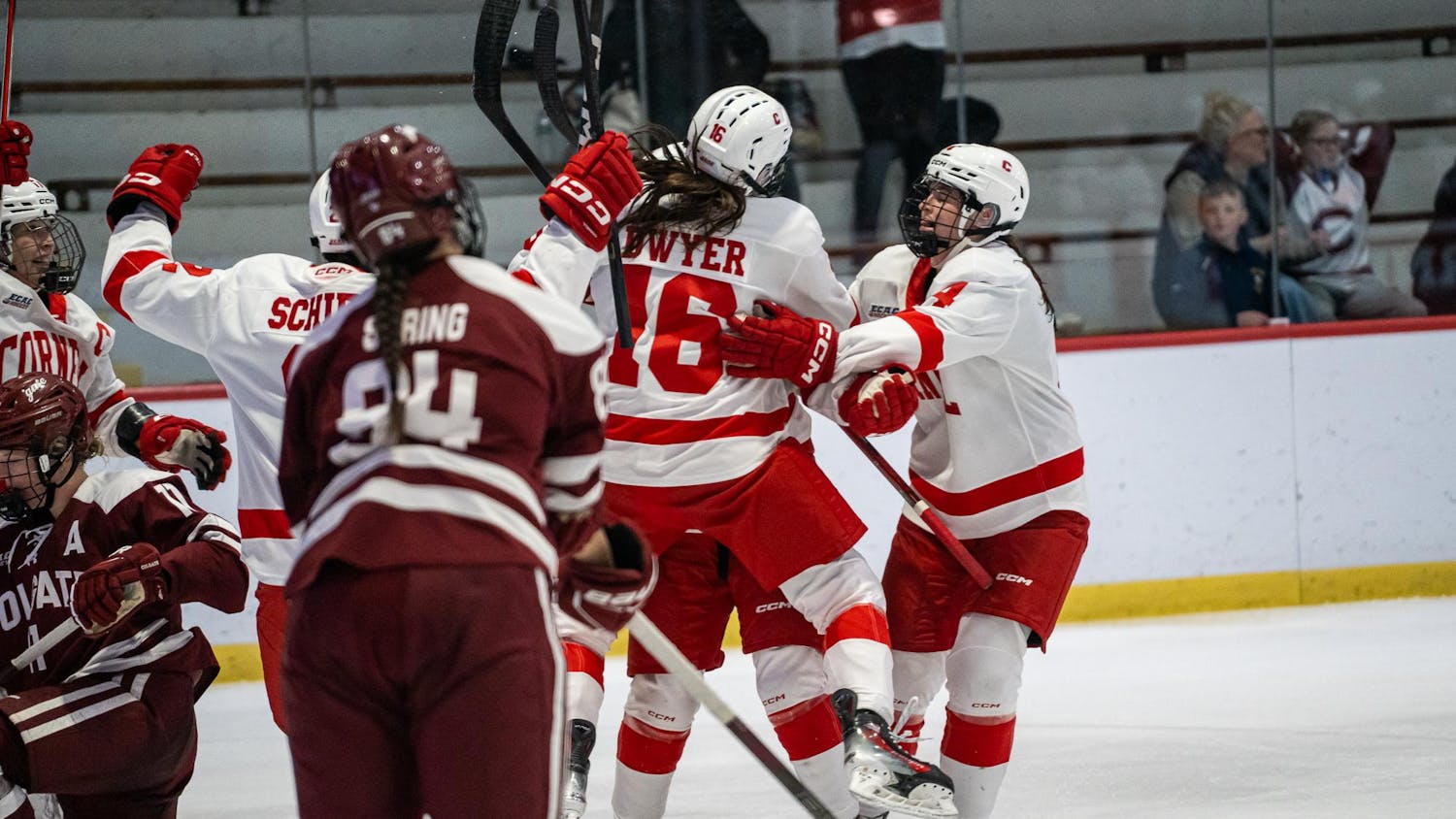“Changing the narrative” is a term, trademarked by Christian Grant-Madison ’25, that represents the driving force of the Men of Color in Athletics.
The group, which just celebrated its one year anniversary in April, is a student-led organization at Cornell “dedicated to supporting and empowering men of color within Cornell Athletics.”
The Sun sat down with three of the executive board former members, Devin Malone ’25, Tismark Boham ’25 and Luc Francis ’25 to learn more about the organization and its future.
Drawing Inspiration From WOCA
In April 2024, MOCA was created with a vision of fostering a sense of unity and representation to minorities within athletics at Cornell, the greater Ithaca community. The board members noticed that its sister organization, Women of Color in Athletics, had been active since 2022 and decided to found an organization for men seeking that same representation.
“We thought that it was important to create a platform for young black [male] athletes as well,” Francis said. “One, emphasizing that we have a position of leadership as athletes, and then also amplifying underrepresented voices as well,” Francis said.
Francis was a member of the men’s swim and dive team on campus and serves as the community outreach chair for the organization. His roles include making announcements via the organization’s various channels and creating connections with administration and student organizations for future social and professional events.
MOCA’s title has led some students on campus to believe that the organization was inclusive to only black male athletes, but Boham, former captain of the golf team and events coordinator of the organization explained that the goal of MOCA is to be “as inclusive as possible” to athletes on campus.
“Having the title ‘Men of Color in Athletics’ seems to some people, as exclusive, because we’re defining our group by race and by sports, but we do try to include as many groups as possible,” Boham said.
The group offers professional development opportunities like resume workshops, professional headshots and mock interviews. In addition, they volunteer within the Ithaca community, tutoring children kindergarten through fifth grade. They also host fun community events like game nights or watch nights for athletic matches.
In April, the club hosted an end-of-semester event called Soul Fest. The event included backyard games, food and music. The community was able to connect with one another, while celebrating the semester coming to an end. Francis reflected on how members of an Asian fraternity came out and supported the event, highlighting the diversity and inclusion vision of MOCA.
On top of putting together events, Malone, former defensive lineman on the football team and co-professional development chair, emphasized how being a part of the organization has “diversified” his family and network which he is “appreciative of.”
“Some of the most interesting conversations I’ve had are with family who weren’t really family,” Malone said. “We had love, which I think is as strong as any blood could be, and through that love and understanding of each other, they can say things to me that they felt they couldn’t.”
In addition, Francis highlighted how the organization had amassed over 50 members within its first full year of operations, demonstrating that there was a clear need for this community and genuine interest from all demographics on campus.
Along with building a community, MOCA provides mentorship to its underclassmen members, with the board members taking on the majority of the responsibility. They make themselves available so that any member can ask questions or seek guidance, whether that is with a specific sport, a certain class or life in general.
Francis highlighted mentorship as a key pillar of MOCA’s mission statement, stating that the senior to underclassmen relationship is very important.
“That sort of senior [and] underclassmen relationship, in terms of mentorship, is very important,” Francis said. “Being a student athlete that has career ambitions and is academically involved is something that is uniquely difficult to navigate, and so having upperclassmen that can serve as that compass for you, is one of the things we hope to do.”
The organization’s members will routinely go to elementary schools like Newfield Elementary School in Newfield, NY (located 20 minutes outside of Ithaca) to tutor children between the ages of five and ten. Francis says that the school is “predominantly white [and] low-income” so mentorship there is important to the community. Members of MOCA impart lessons, guidance and tutoring for the children.
“There are some kids of color within the school, but when we show up and we go to New Field, it's a way to mentor and uplift kids that are not just underrepresented kids, but all kids,” Francis said.
The Future of MOCA at Cornell
As the entire executive board is made up of seniors, they are determined to establish a network for all members to remain connected.
“We will make a directory, and then there will be numbers there, so when you join MOCA, you’ll have Devin [Malone’s] LinkedIn. I’ll connect with you automatically, he [Boham] will too,” Malone said. “And as you build this foundation, not only are we passionate and we have this love and this brotherhood, but we have money, which is very important. With money comes more power, and then we can help more people.”
The founders’ main objective at this point is to continue to expand the base of MOCA members and ultimately leave a legacy of leadership that others can be inspired by. In creating this organization, they will show the future underclassmen that it is possible to succeed, and they can do it too, regardless of race.
“I would hate it if people just had fun at MOCA to be honest. [I want] a statistic where it's like ‘if you [join] MOCA, you’re this much more likely to get a job.’ I want that number to keep increasing every year. If this [senior class] can be the standard that we set and, and we make that the standard for the program, we can uplift a lot of people who may not have even thought that they could do these things.”
Malone then went on to emphasize the importance of celebrating academic achievements, instead of only highlighting plays made on the field or on the court.
“We need to start showing our brothers and sisters love for getting As in classes, and getting internships,” Malone says. “I think so many more black boys looking for love and acceptance in this world, would pursue something of more value than dribbling a ball [if they received this praise].”
Ultimately, his goal for MOCA, is that the organization can be the mirror by which people can reflect on their lives to find their passions and to determine what they are truly working towards in life.
“What I think MOCA [should] be, is something that complements a larger college experience, and emphasizes moments of self-reflection,” Francis said. “Something that I would want to emphasize to a lot of other people, is to find mirrors to look into, so that way, you’re also learning about the world around you, and you’re really thinking about what your purpose is and what your mission is.”











